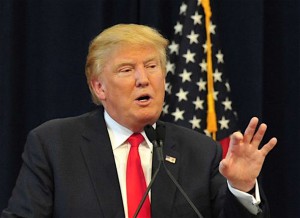
President-elect Donald Trump faces a difficult task in sorting out what to do about the EPA's new targets for renewable fuel standard, if anything.
President-elect Donald Trump is going to have start picking which “child” is his favorite among part of the “big business” set: Big Oil or Big Corn.
Trump is already hearing from both groups after the Obama Administration submitted its final plan for renewable fuel use, i.e. adding ethanol and biodiesel to gasoline and diesel to lower greenhouse gas emissions, which instituted loftier-than-ever targets for fuel producers.
This new plan, put together by the Environmental Protection Agency, left the oil industry crying foul while farmers scramble to remind Trump of his pro-ethanol stance put forth during the campaign.
The “plan” is actually the Renewable Fuel Standard (RFS) program. President George W. Bush signed it into law and since its creation then it has been one of the country’s most controversial energy policies.
In addition to being good for the environment, proponents also suggest the program reduces U.S. reliance on oil imports and boosts rural economies that provide the crops for biofuels. However, oil producers claim that the extra costs required to produce the “enhanced” products and infuse them into gasoline and diesel is prohibitive.
Trump is going to have to walk a tightrope to keep both sides happy, or at least equally unhappy, as he’s campaigned on cutting regulations to the oil industry. Industry groups are already lining up on either side of the issue to make their cases and, if necessary, attempt to hold Trump’s feet to the fire.
Chet Thompson, president of the American Fuel and Petrochemical Manufacturers, says the EPA’s new plan is untenable and the program fails to meet its goals.
“While we appreciate the difficulty of the task before EPA, the agency’s decision to increase the 2017 RFS volumes is completely detached from market realities and confirms once again that Congress must take immediate action to remedy this broken program,” he said.
(Trump Commerce Secretary Ross well-versed in Mexico auto industry. Click Here for the story.)
“A decade has passed since promulgation of the program and the cellulosic biofuels industry still has not delivered on its promise of commercially viable fuels. Despite this reality, EPA unfortunately finalized a RFS volume requirement that looks to force more biofuel in the fuel supply than consumers want or infrastructure can handle. Refiners should not have the responsibility to force consumers to use products they either don’t want or that are incompatible with their cars, boats, and motor equipment.”
Oil industry advocates are heartened by Trump’s choice to head up the EPA: Myron Ebell. A well-known climate change skeptic, Ebell directs environmental and energy policy at the Competitive Enterprise Institute, a libertarian advocacy group in Washington D.C.
His feelings about how energy policies, like the RFS, should be formulated are pretty clear.
“There is serious scientific debate about the magnitude, rate, and potential impacts of global warming, and the policies appropriate to address it,” he wrote in a recent blog post.
“And, I believe that we should pursue energy policies based on the scientifically-supported view that abundant energy makes the world safer and the environment more livable, as well as the humanitarian view that affordable energy should be accessible to those who need it most, particularly the most vulnerable among us.”
While Ebell’s feelings are clear, what is less certain is what Trump plans to do with the program, according to Reuters, which added the transition team did not respond to Reuters’ requests for comment.
(Click Here for details about Trump’s plans for EVs.)
And just because the prohibitive new leader of the EPA isn’t onboard with the RFS that doesn’t mean the pro-ethanol lobby is going quietly into any good night.
Trump’s pro-ethanol platform he espoused while campaigning in America’s farm states have advocates expectant that he will keep the RFS strong, maintaining annual targets at the minimum set forth by Congress.
The renewables industries have already started to emphasize their place among American-made fuels, something experts expect will appeal to Trump.
“There are a lot of good things to be said about second-generation fuels, even from the new administration’s perspective,” said Harvard University professor and former Obama administration advisor James Stock told Reuters. “All the new administration needs to do is embrace the original … vision of the RFS.”
Additionally, the rural areas growing the products used for the additives are essentially home to the voting bloc that came out in droves to give Trump the presidency over the favored Hillary Clinton. To be sure advocates will remind him of that.
(Change coming to auto industry. Click Here for more.)
“Mr. Trump will not turn his back on the American heartland, we believe in him,” said Annette Sweeney, a former state representative from Iowa who was a member of the Trump’s agricultural advisory committee during his candidacy, according to Reuters.



That’s what happens when you tell each side what they want to hear. Politicians make promises all the time to be sure but they’re much better at making fuzzier (and more realistic) statements.
Gee, who knew that being POTUS would be so hard?